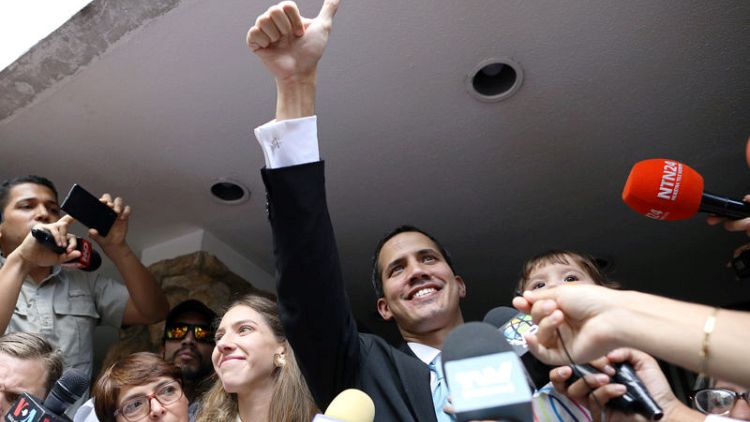By Robin Emmott and Alissa de Carbonnel
BRUSSELS (Reuters) - The European Parliament recognised Venezuela's self-declared interim president Juan Guaido as de facto head of state on Thursday, heightening international pressure on the OPEC member's socialist President Nicolas Maduro.
EU governments, divided over whether to recognise Guaido, also agreed to lead an international crisis group with South American nations to seek new elections, setting a 90-day time limit, and threatening further economic sanctions.
EU lawmakers voted 439 in favour to 104 against, with 88 abstentions, at a special session in Brussels to recognise Venezuelan congress head Guaido as interim leader.
In a statement with the non-binding vote, the parliament urged the bloc's 28 governments to follow suit and consider Guaido "the only legitimate interim president" until there were "new free, transparent and credible presidential elections".
Hungary's Foreign Minister Peter Szijjarto said he was ready to join a common position on Venezuela if the bloc could agree what next steps to take.
Though accusing Maduro of stifling democracy, the European Union is nervous at the precedent of a self-declaration, so has been reluctant to follow the United States and most Latin American nations with immediate recognition of Guaido.
Britain, France, Germany and Spain said on Saturday, however, that they would recognise Guaido unless Maduro called elections within eight days. But the EU as a whole has not set a time limit in its call for a new presidential vote and in its Bucharest meeting did not take a clear position.
EU foreign policy chief Federica Mogherini said governments including Britain, France, Germany, Spain and Italy would take part in a so-called international contact group, along with Bolivia, Ecuador and other countries.
TIME LIMIT
Though not strictly a mediation role, the countries would coordinate policies to try to bring the Venezuelan opposition and Maduro closer, avoid repression and agree new elections.
"It is not about mediating. It is not about creating forms of dialogue. We have seen processes before that have been indeed used just to buy time," Mogherini said, adding that the group would be terminated after 90 days if it did not make progress.
"The purpose of the exercise is to accompany the country in a peaceful and democratic manner towards peaceful and democratic and free elections," she said during a break in the EU foreign ministers meeting.
Asked about the chances of the group succeeding in resolving the crisis, the EU's foreign policy chief said: "We are taking a big risk, in the sense that the signs are not particularly encouraging."
Maduro has dismissed the demands as an unacceptable ultimatum from the corrupt elite of spent colonial powers.
"The leaders of Europe are sycophants, kneeling behind the policies of Donald Trump," he said at the weekend.
As Venezuela has sunk into economic and political crisis that has brought mass emigration and hyperinflation, the EU imposed an arms embargo and sanctions on officials to decry what it views as rights violations and the rupture of democracy.
On Thursday, the Brussels-based International Federation of Journalists said seven foreign journalists were detained in Venezuela, including French and Spanish reporters. Mogherini called for their release.
Mogherini also warned that more economic sanctions, normally in the form of asset freezes and travel bans, were an option if dialogue with Maduro failed.
(This story corrects to remove quote in paragraphs 5 and 6 mistakenly attributed to British Foreign Secretary Jeremy Hunt.)
(Additional reporting by Clare Roth; Editing by Andrew Cawthorne and Catherine Evans)
